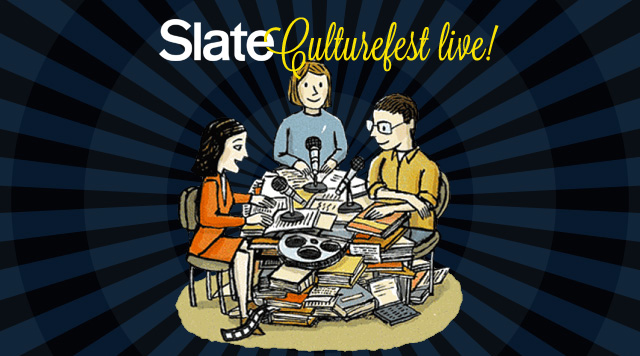The Best And The Worst Of The Slate Culture Gabfest
By Staff in Arts & Entertainment on Sep 21, 2015 4:50PM

By podcast standards, Slate’s Culture Gabfest is ancient. A spinoff of Slate’s Political Gabfest, it premiered in 2008, six years before Serial and seven years before Mystery Show.
Every week since, the show’s three hosts—editor Julia Turner, film critic Dana Stevens and columnist-slash-thesaurus-user Stephen Metcalf—have discussed three current cultural issues per week. The topics are a mix of highbrow, lowbrow and brow-less wildcards (e.g., how much some people hate flip-flops).
The topics give the popular show some structure, but at its core, the Gabfest is a conversation. That’s translated into some insightful shows, and others so bad that I audibly gasped on the bus. In honor of the Culture Gabfest’s first live show in Chicago, here are its highest highs and its lowest lows.
The Best Episodes
“Thousands Ridicule Teen Singer” edition
March 23, 2011
The topics: Netflix’s first foray into original programming, Rebecca Black’s “Friday,” and the “right to be forgotten” on the Internet
Why it’s the best: In this episode, the hosts ostensibly discuss Netflix’s first original TV show, House of Cards. Really, though, they talk about Netflix’s slow-burn media takeover, and accurately predict the future. They break down how Netflix has revolutionized TV and movie-watching; Julia notes that she no longer buys DVDs, and asks, chillingly, “Will we have any cultural objects left in our homes in thirty years?” They also wonder if House of Cards is the first hint at Netflix’s next act: changing how TV gets made and distributed. It’s fun listening to them situate not-too-thrilling news in a larger cultural shift, especially because they’re spot on about the present. Extra perks: The “right to be forgotten” is still being discussed today, and we all get to walk through the world knowing that Steve has been forced to listen to “Friday.”
“Piece of Resistance” edition
February 12, 2014
The topics: The Lego Movie, the effect of the Sochi games on U.S.-Russia relations, and historical photos on Twitter
Why it’s the best: This episode’s segment on The Lego Movie is so much more interesting than Dana’s written review, it makes a strong case for the podcast format. Rather than running through a roster of directors and screenwriters, the hosts jump fairly quickly into the question (not discussed in most reviews) of what it means for a movie to be Lego-branded. Does it mean the radical underlying message is just a ploy to sell Legos? Does it mean that branded content can be quality art? The discussion is lively, and also touches on the up-and-coming field of Lego aesthetics.
“Abstract Nouns” edition
December 25, 2013
The topics: Vocabulary, conversation and voice
Why it’s the best: This episode departs from the show’s usual format, and focuses on three evergreen, language-related topics. The hosts tackle them with Golden Retriever-esque enthusiasm, and in the process, shine new light on everyday talking and writing. This is especially true in the middle segment, when they wax philosophical about what “good conversation” means. In the process, they consider a bunch of interesting factors: setting, the frequency with which people share anecdotes and the balance between humor and courtesy. You’ll feel too self-conscious to talk for several days after this one, but in a good way.
The Worst Episodes
“The New York Review of Taylor Swift” edition
November 5, 2014
The topics: Taylor Swift’s 1989, The 50 Year Argument, and Hollaback’s street harassment video
Why it’s the worst: There are valid reasons to critique Taylor Swift (her colonial fantasies, the line she doesn’t draw between friendship and marketing), but Stephen doesn’t stumble upon any of them in this episode. Instead, he calls her a “synthetic doll creature,” shares his baseless suspicion she doesn’t really write her songs, and refers to her as “product.” His opinions swallow the segment, and when Julia points out how sexist he sounds, he’s offended “as the father of two daughters”—a new incarnation of the terrible old “but I have black friends!” defense.
"#Squadgoals edition"
August 5, 2015
The topics: Mission Impossible: Rogue Nation, #squad, and country music for people who don’t like country music
Why it’s the worst: In the middle segment, featuring guest and Slate writer Katy Waldman, something truly bold happens: Four white people who never say “squad” in daily life discuss it anyway. Waka Flocka, the rapper who coined the term, is relegated to a footnote in the conversation. Taylor Swift, on the other hand, takes center stage, because she made the term trendy (read: accessible to white people). As Judnick Mayard put it, writing about this episode in The Guardian, “The underlying tone is always: ‘It doesn’t matter when the black kids do it; let’s just focus on how we found out about it.’”
"New Theme Song edition"
December 31, 2014
The topics: The whole episode is about the process of creating a new podcast theme song, which the hosts undertake with composer Nick Britell
Why it’s the worst: This episode goes behind the scenes, but what’s back there is unsatisfying. The hosts don’t have the vocabulary to describe what they want out of a theme song (their most comical request is for “something that will challenge people but doesn’t trouble the conscience”). They also clearly want Nick to look good, and praise his work so lavishly it feels a bit like an ad. Ultimately, they settle on a song that sounds like birds chirping over hold music, which is fine—but who stays up at night wondering how serviceable, commercial songs get made?
On average, the Slate Culture Gabfest is super entertaining. Their Chicago live show will be at the Music Box on Tuesday, September 22. Doors are at 7 p.m. Tickets are $25 here.
By Mae Rice